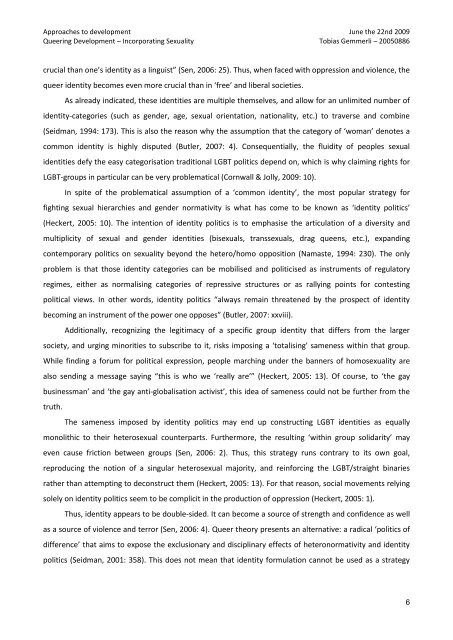Queering Development - Incorporating Sexuality - The problem of ...
Queering Development - Incorporating Sexuality - The problem of ...
Queering Development - Incorporating Sexuality - The problem of ...
Create successful ePaper yourself
Turn your PDF publications into a flip-book with our unique Google optimized e-Paper software.
Approaches to development June the 22nd 2009<strong>Queering</strong> <strong>Development</strong> – <strong>Incorporating</strong> <strong>Sexuality</strong> Tobias Gemmerli – 20050886crucial than one’s identity as a linguist” (Sen, 2006: 25). Thus, when faced with oppression and violence, thequeer identity becomes even more crucial than in ‘free’ and liberal societies.As already indicated, these identities are multiple themselves, and allow for an unlimited number <strong>of</strong>identity-categories (such as gender, age, sexual orientation, nationality, etc.) to traverse and combine(Seidman, 1994: 173). This is also the reason why the assumption that the category <strong>of</strong> ‘woman’ denotes acommon identity is highly disputed (Butler, 2007: 4). Consequentially, the fluidity <strong>of</strong> peoples sexualidentities defy the easy categorisation traditional LGBT politics depend on, which is why claiming rights forLGBT-groups in particular can be very <strong>problem</strong>atical (Cornwall & Jolly, 2009: 10).In spite <strong>of</strong> the <strong>problem</strong>atical assumption <strong>of</strong> a ‘common identity’, the most popular strategy forfighting sexual hierarchies and gender normativity is what has come to be known as ‘identity politics’(Heckert, 2005: 10). <strong>The</strong> intention <strong>of</strong> identity politics is to emphasise the articulation <strong>of</strong> a diversity andmultiplicity <strong>of</strong> sexual and gender identities (bisexuals, transsexuals, drag queens, etc.), expandingcontemporary politics on sexuality beyond the hetero/homo opposition (Namaste, 1994: 230). <strong>The</strong> only<strong>problem</strong> is that those identity categories can be mobilised and politicised as instruments <strong>of</strong> regulatoryregimes, either as normalising categories <strong>of</strong> repressive structures or as rallying points for contestingpolitical views. In other words, identity politics “always remain threatened by the prospect <strong>of</strong> identitybecoming an instrument <strong>of</strong> the power one opposes” (Butler, 2007: xxviii).Additionally, recognizing the legitimacy <strong>of</strong> a specific group identity that differs from the largersociety, and urging minorities to subscribe to it, risks imposing a ‘totalising’ sameness within that group.While finding a forum for political expression, people marching under the banners <strong>of</strong> homosexuality arealso sending a message saying “this is who we ‘really are’” (Heckert, 2005: 13). Of course, to ‘the gaybusinessman’ and ‘the gay anti-globalisation activist’, this idea <strong>of</strong> sameness could not be further from thetruth.<strong>The</strong> sameness imposed by identity politics may end up constructing LGBT identities as equallymonolithic to their heterosexual counterparts. Furthermore, the resulting ‘within group solidarity’ mayeven cause friction between groups (Sen, 2006: 2). Thus, this strategy runs contrary to its own goal,reproducing the notion <strong>of</strong> a singular heterosexual majority, and reinforcing the LGBT/straight binariesrather than attempting to deconstruct them (Heckert, 2005: 13). For that reason, social movements relyingsolely on identity politics seem to be complicit in the production <strong>of</strong> oppression (Heckert, 2005: 1).Thus, identity appears to be double-sided. It can become a source <strong>of</strong> strength and confidence as wellas a source <strong>of</strong> violence and terror (Sen, 2006: 4). Queer theory presents an alternative: a radical ‘politics <strong>of</strong>difference’ that aims to expose the exclusionary and disciplinary effects <strong>of</strong> heteronormativity and identitypolitics (Seidman, 2001: 358). This does not mean that identity formulation cannot be used as a strategy6
















